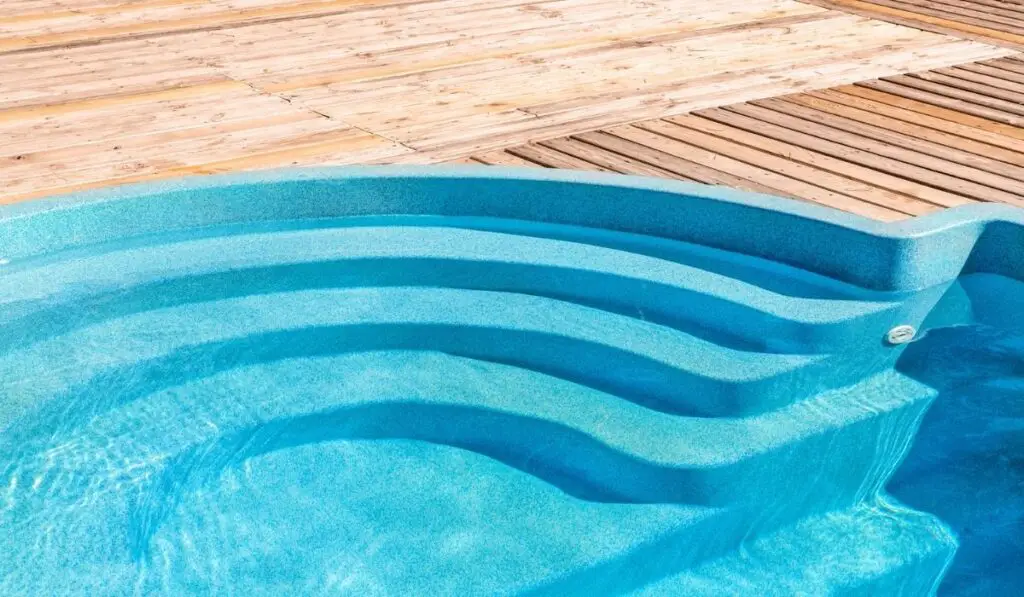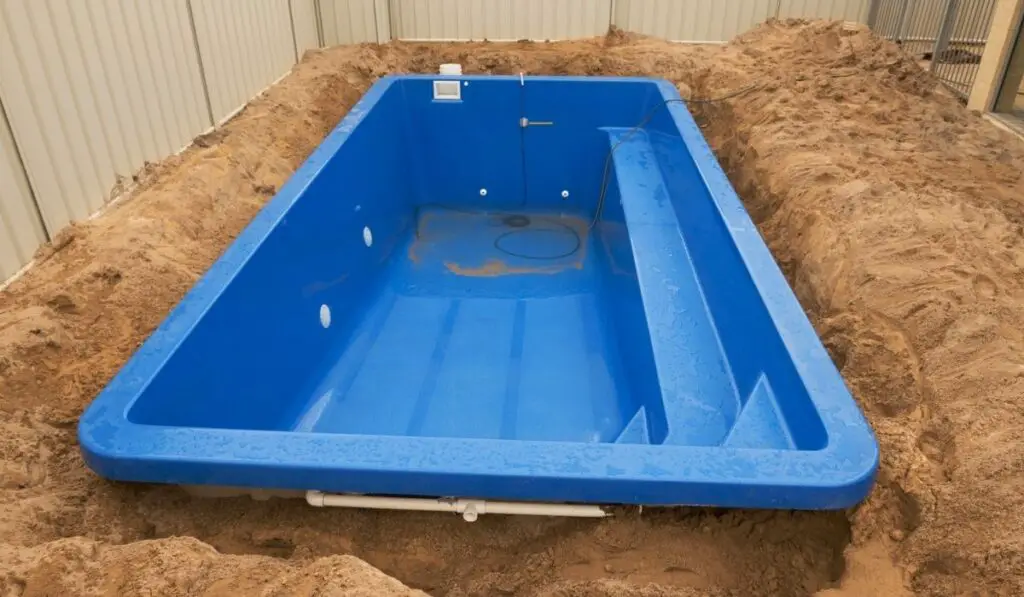If you’re considering installing a pool on your property, then you’re probably already familiar with the wide variety of options out there. It can be a real challenge deciding which material is best — and the first step is knowing what’s actually possible. So, can a fiberglass pool be installed above ground?
Fiberglass pools can be installed above ground. This option is usually less expensive than installing an in-ground pool and can be done in a shorter time frame. Above-ground pools are also easier to maintain and don’t require constant care. However, they usually don’t add value to a home.
Let’s take a closer look at some of the pros and cons of above-ground pools to help you decide if one is suitable for your property. And we’ll also explain why an “investment” in a pool doesn’t necessarily add to your home’s potential sale price.
Can Fiberglass Pools Be Installed Above Ground?

Fiberglass pools can be installed both in and above ground, but there are a few things to consider before deciding. Above-ground pools are typically less expensive and easier to install than in-ground pools, but they may not offer the same aesthetic appeal or functionality.
Fiberglass pools can be more susceptible to damage from severe weather when installed above ground, so it’s important to take steps to protect your pool during storms. However, an above-ground fiberglass pool can last for many years with proper installation and maintenance.
Reasons to Consider an Above-Ground Fiberglass Pool
There are several reasons to consider an above-ground fiberglass pool over other types of pools. For starters, it’s the better choice if you’re uncertain about the future and don’t want to commit to a mor permanent in-ground pool.
Unlike inground pools, above-ground pools don’t involve excavation, which means they’re less disruptive and less expensive to install.
They’re also a good choice if you have a small backyard and don’t want your new pool to take up too much space. Another reason to consider an above-ground pool is if you’re concerned about the safety of your children.
Above-ground pools are raised and typically have a higher fence around them, making it more difficult for small children to access the pool without supervision.
Finally, you might want to consider an above-ground pool if you reside in an area prone to flooding. In-ground pools can be easily damaged by floodwater, leaving you with a hefty repair bill. Above-ground pools are less susceptible to this type of damage.
Pros and Cons of an Above-Ground Fiberglass Pool
There are several pros and cons to consider before settling on an above-ground fiberglass pool.
Benefits of an Above-ground Fiberglass Pool
Aesthetics
An above-ground fiberglass pool looks just as good as an in-ground pool. In fact, many people believe that they look even better, since you have a great deal more choice when it comes to the shape, size, and color of your pool. You can also add decking and other features to make it your own.
Improved Safety
An above-ground pool is raised from the ground, which improves safety for small children and pets who may wander into the backyard. The added height also makes it much harder for children to climb into the pool without supervision.
Furthermore, most above-ground pools come with a ladder that can be removed when not in use or only used by adults.
Convenience
An above-ground pool is much easier to take care of than an in-ground pool. They are typically smaller, so you won’t need as many chemicals to maintain the pH level, and they don’t require as much vacuuming. You will also save time by not having to brush the sides and bottom of the pool frequently.
Disadvantages of an Above-Ground Pool
Limited Space
An above-ground pool may be your only option if you have a small backyard. However, it’s important to note that these pools still take up a significant amount of space, so you might not have much room leftover for entertaining or relaxing.
You may also need to construct decking or a patio to provide extra space around the pool.
Permits and Zoning
Depending on where you live, you may need to obtain a permit to install an above-ground pool. In some cases, you may also need to adhere to certain zoning regulations. Be sure to check with your local building department before installing a pool.
Limited Resale Value
When it comes time to sell your home, an above-ground pool won’t add value to the sale price. In fact, many buyers see above-ground pools as a negative and may be turned off by having to deal with it. Even though you find value in the pool, that doesn’t necessarily mean a potential home-buyer will.
In-ground vs. Above-Ground vs. Partially In-Ground

Fiberglass pools come in various shapes and sizes to fit any backyard. But with so many choices, how do you know which one is right for you? Here’s a quick guide to the three most popular types of fiberglass pools:
In-ground fiberglass pools are the most popular type of fiberglass pool. They’re installed entirely below ground level, which gives them a more natural look and feel. They’re also durable and can be customized with various features and options.
Above-ground fiberglass pools are installed above the ground. They’re a great option for small yards or tight budgets. They’re easy to install, and you can even take them with you if you move. They’re great for families with young children because they can be installed with a safety fence to prevent accidental drowning.
Partially in-ground fiberglass pools are a hybrid of the two previous types. They’re installed partly below ground level, which gives them a more natural look than an above-ground pool. But they’re not as durable as an in-ground pool, and they can’t be customized with as many features and options.
How Long Do Fiberglass Pools Last?
Fiberglass pools are more durable than concrete and vinyl liner pools. They have a lifespan of about 30 years, but with the proper care, they can last up to 50 years.
Fiberglass pools are made from fiber-reinforced plastic (FRP) that is gel-coated to resist fading and staining. The smooth surface of a fiberglass pool is non-porous, making it resistant to algae growth.
Fiberglass pools are also freeze-resistant, which means they can withstand colder climates without cracking or chipping. It’s important to perform regular maintenance, including brushing, vacuuming, and skimming, to extend the lifespan of your fiberglass pool.
